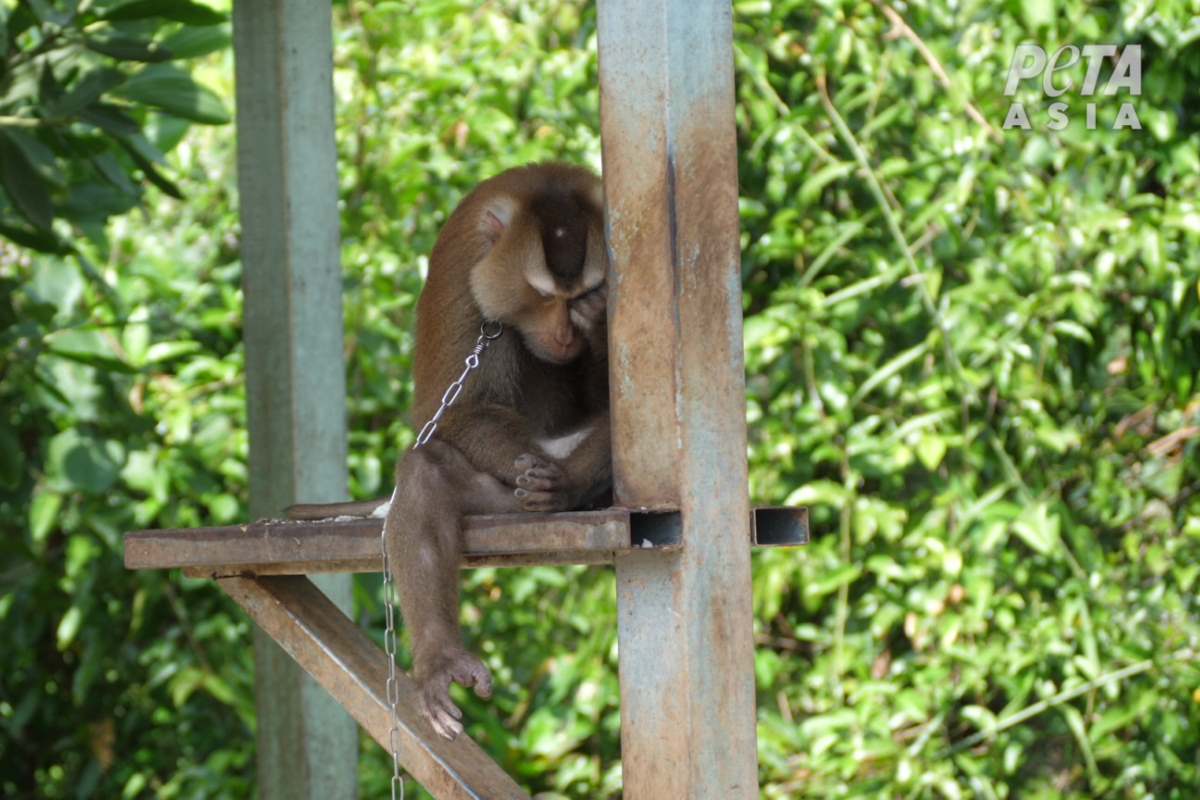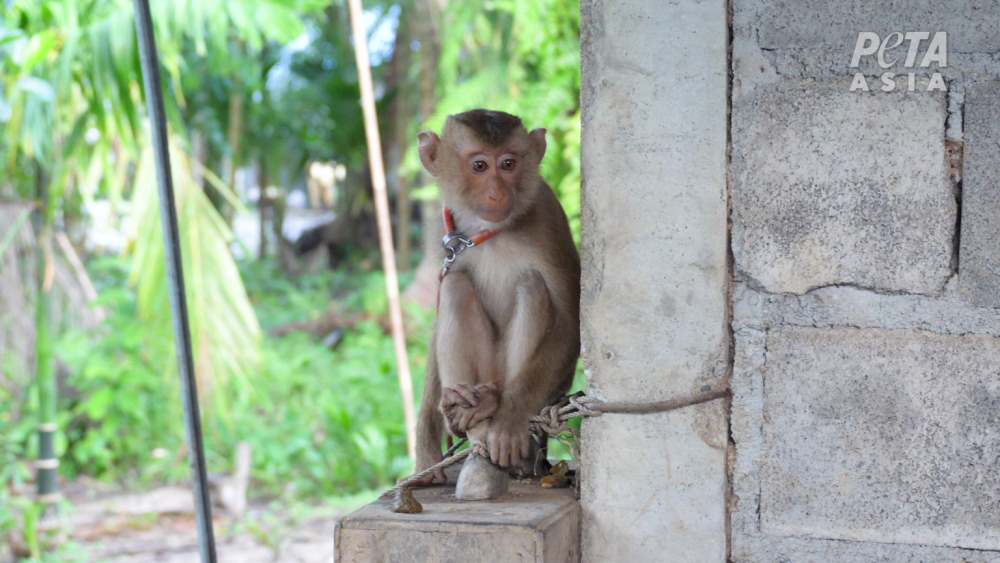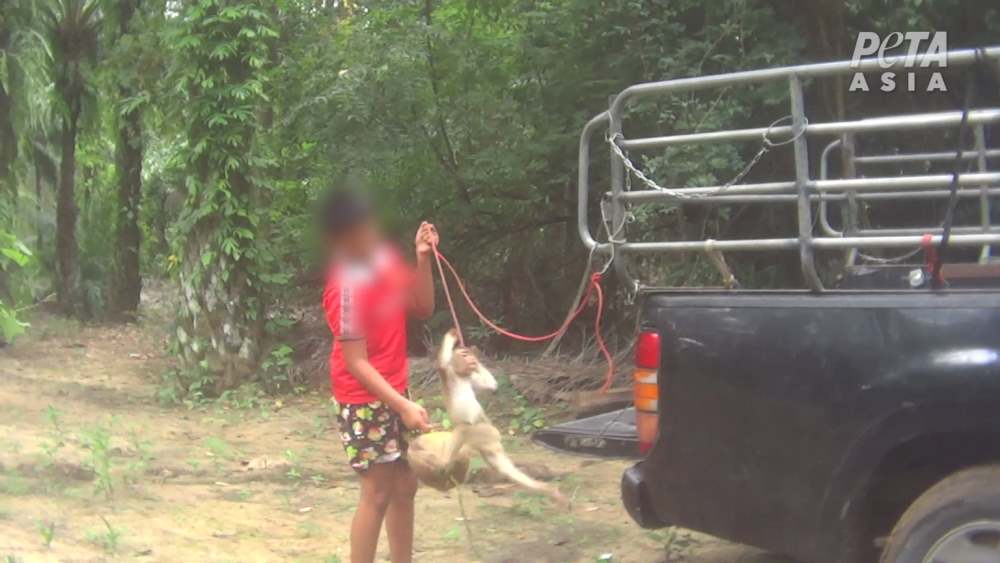For eight months, from December 2021 to July 2022, PETA Asia conducted its third investigation into the coconut industry in Thailand, where chained monkeys are forced to spend long hours climbing tall trees and harvesting heavy coconuts

Thailand’s coconut industry continues to face scrutiny as the use of monkey labor remains a pressing issue. Despite being kidnapped as infants and subjected to mistreatment, macaques are particularly exploited as slaves for harvesting coconuts, which are then processed into coconut oil for global export and consumption.
Over eight months, from December 2021 to July 2022, PETA Asia conducted its third investigation into Thailand’s coconut industry. The findings, shockingly, have not significantly changed.
In response to international criticism following the publication of PETA Asia’s two previous investigations, the Thai government and coconut product manufacturers had claimed that monkeys would no longer be used in the production of exported goods. However, PETA Asia’s new investigation confirmed that rampant primate abuse remains unchecked, with insiders in the Thai coconut industry deliberately hiding monkey labor in their supply chain.
The new PETA investigation
In the wild, macaques live in large groups with strict hierarchies and a strong focus on social relationships. Yet, in one of the investigated facilities, young monkeys being trained for coconut harvesting were kept away from other members of their species, caged and chained with rigid metal collars, constantly intimidated to teach them obedience. In another facility, investigators observed a female monkey chained and kept away from other monkeys, without food or water nearby and under the sun.
Investigative footage shows a trainer hitting a monkey, swinging it by the neck, and then whipping it with a rope. Furthermore, a boy attempting to train another frightened monkey yanks it by the chain around its neck, repeatedly swinging it through the air – likely restricting its oxygen – as it desperately tries to grab the rope.
Once their training is complete, the monkeys are sold to coconut harvesters. An employee of a farm visited by investigators revealed that while the monkeys climb the trees, they often get bitten by ants and stung by hornets, which can be fatal.
Thus, they continue, for the rest of their lives, forced to harvest coconuts for more than a decade before being “retired”. In many cases, some monkeys are then abandoned in the forest, utterly incapable of surviving on their own after being raised in captivity.


The lies told by Thailand’s coconut industry
A coconut seller who spoke with an investigator acknowledged that following PETA Asia’s previous investigations, there had been intense international pressure on the industry to stop using forced monkey labor. Nearly 40,000 grocery stores worldwide have dropped major Thai coconut milk producer Chaokoh and other brands known to be complicit in monkey suffering.
Rather than working towards a significant transition to animal-free harvesting methods, companies, intermediaries, producers, and the Thai government are instead attempting to mislead consumers. According to the investigations, coconut harvesters simply lie, intermediaries continue to buy coconuts harvested by monkeys and sell them to companies producing coconut-based products, and those companies and the government promote their “monitoring system”, even though it primarily relies on the producers’ word.
Dishonesty is a hallmark of Thailand’s coconut industry, concludes PETA Asia. It’s impossible to guarantee that any canned coconut milk produced in Thailand, including those sold by Chaokoh and Ampol Food (whose parent company is Theppadungporn Coconut Co.), Aroy-D, Tropicana Oil, Thai Pure, Ampawa, Edward & Sons Trading Co., did not involve forced monkey labor. However, numerous other companies can offer this guarantee, marketing products made with coconuts harvested in the Dominican Republic, India, Indonesia, Philippines, Vietnam, and other countries. PETA urges consumers to only purchase canned coconut milk from brands that source coconuts outside of Thailand.
